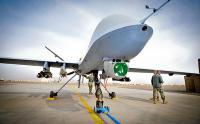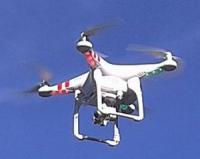-
Engineers design invisibility cloak for military drones
Inspired by the well-known Invisibility Cloak from Harry Potter, electrical engineers have created a new design for their cloaking device, using a Teflon substrate, studded with cylinders of ceramic, which is thinner than any prior development and does not alter the brightness of light around concealed objects. The Teflon has a low refractive index, while the ceramic’s refractive index is higher, which allows light to be dispersed through the sheet without any absorption. Compared to an invisibility cloak, this technology has not only the ability to conceal, but the ability to increase optical communication signal speed and to collect solar energy.
-
-
Data show drone attacks doomed to fail against ISIS in Syria

This week, the Washington Post published a story about a new U.S. plan to use lethal drone strikes in Syria to destroy ISIS capabilities on the ground. The desire to do something — anything — to destroy the capabilities of a group so luridly destructive is understandable, but our haste to show results will likely result in a hollow victory at best. But there is a problem: there’s no evidence that drone strikes work. On the contrary, ample evidence shows drone strikes have not made Americans safer or reduced the overall level of terrorist capability. The strikes amount to little more than a waste of life, political capital, and resources. Drones cannot deliver victory over ISIS, but in any event, lacking a cohesive, articulate political strategy for governance and post-ISIS reconstruction, no military solution can produce the results we’re looking for. Lacking the political strategy, more of the same in Syria promises no better.
-
-
Apple's encryption prevents it from complying with U.S. court order
Apple said it could not comply with a court order to hand over texts sent using iMessage between two iPhones because the company’s encryption system makes it impossible to do so. The Justice Department persuaded the court to issue the order to facilitate an investigation involving guns and drugs. Legal experts say this is the first known direct face-off between the U.S. government and Apple over encryption. The FBI contends that such encryption puts the American public at risk because it makes it harder, if not impossible, to track and catch terrorists, pedophiles, and other criminals.
-
-
Counter-drone technologies demonstrated at DoD’s Black Dart event
Small, unmanned aircraft systems (UASs, aka UAVs, for unmanned aerial vehicle), or drones, are easy to obtain and launch and they are hard to detect on radar, making them of particular concern to law enforcement and the Department of Defense. Earlier this month DHS circulated an intelligence assessment to police agencies across the United States warning about drones being used as weapons in an attack. DOD says that Black Dart 2015, which began 26 July and ran through 7 August, is the Department of Defense’s largest live-fly, live-fire joint counter-UAS technology demonstration. One of the innovative developers of counter-UAS technologies is SRC Inc., a not-for-profit company formerly affiliated with Syracuse University. The company showed its SR Hawk surveillance radar, which is integral to its layered approach to defending against UASs.
-
-
Sandia teams with industry to improve human-data interaction
Intelligence analysts working to identify national security threats in warzones or airports or elsewhere often flip through multiple images to create a video-like effect. They also may toggle between images at lightning speed, pan across images, zoom in and out or view videos or other moving records. These dynamic images demand software and hardware tools that will help intelligence analysts analyze the images more effectively and efficiently extract useful information from vast amounts of quickly changing data. Sandia Lab and EyeTracking, Inc. will research and develop tools to improve how intelligence analysts gather visual information.
-
-
Sound waves disable drones by disrupting the drone’s gyroscope

Hobbyists’ drones are becoming a growing national nuisance – violating people’s privacy, breaching security-sensitive airspace, disrupting attempts by firefighters to bring wildfires on the West Coast under control, and more. South Korean scientists report that sound waves could offer an effective protection from drones.
-
-
Bill requiring Internet companies to report “terrorist activity” opposed by digital rights groups
A coalition of digital rights groups and trade associations last week released a joint letter opposing a proposal in the Senate to require U.S. tech firms to police the speech of their users and to report any signs of apparent “terrorist activity” to law enforcement. The letter says that this sweeping mandate covers an undefined category of activities and communications and would likely lead to significant over-reporting by communication service providers. The letter urged senators to remove the “terrorist activity” reporting requirements from the Intelligence Authorization Act (S. 1705).
-
-
New air traffic management system to make drone air traffic safer

Researchers are now working on a new, low-altitude traffic management system to keep fast-moving flyers safer as they cruise through increasingly crowded skies. A handful of organizations are participating in the first phase of the NASA Ames Unmanned Aerial Systems Traffic Management project to enable safer use of low-altitude airspace, of 500 feet and below, where autonomous aerial vehicles, helicopters, gliders, and other general aircraft are operating.
-
-
DHS warns local law enforcement to watch for drones used by terrorists, criminals
DHS has circulated an intelligence assessment to police agencies across the United States warning about drones being used as weapons in an attack. The bulletin went out Friday and warned state and municipal law enforcement agencies that terrorist and criminals may begin to use drones to advance their goals. “Emerging adversary use of Unmanned Aircraft Systems [UAS] present detection and disruption challenges,” the intelligence bulletin warns.
-
-
German prosecutors charge news Web site with treason over leaks of surveillance plan
German authorities have launched a treason investigation into a news Web site which had reported on government plans to broaden state surveillance of online communications. This is the first time in more than fifty years that German journalists are facing treason charges for publishing leaked documents.
-
-
NSA to destroy millions of American call records collected under controversial program
The director of national intelligence said on Monday that the NSA would no longer examine call records collected by the NSA in its controversial bulk collection program before the June reauthorization of the Patriot Act which prohibits such collection. Bulk records are typically kept for five years, but the director said that although the records in the NSA database were collected lawfully, they would not be examined, and would soon be destroyed.
-
-
Journalists’ computer security tools lacking in a post-Snowden world
Edward Snowden’s leak of classified documents to journalists around the world about massive government surveillance programs and threats to personal privacy ultimately resulted in a Pulitzer Prize for public service. Though Snowden had no intention of hiding his identity, the disclosures also raised new questions about how effectively news organizations can protect anonymous sources and sensitive information in an era of constant data collection and tracking. Researchers found a number of security weaknesses in journalists’ and news organizations’ technological tools and ad-hoc workarounds.
-
-
In first case of its kind, UK high court rules surveillance law unconstitutional
Controversial surveillance legislation hustled through parliament last summer has been ruled unlawful by the U.K. High Court, which argued that the vague terms and descriptions of powers in the Data Retention and Investigatory Powers Act 2014 (DRIPA) renders the act incompatible with human rights under European law. DRIPA, one in a series of laws supporting controversial surveillance powers passed by successive U.K. governments, establishes the principle by which anti-terrorism measures and national security priorities take precedence over human rights considerations. However, the judgment rules that the EU Charter of Fundamental Rights must take precedence, and in doing so requires the U.K. government to undo its own act of parliament — a significant precedent by a British court.
-
-
FAA investigating teen’s gun-toting drone
An 18-year-old Connecticut man may have run afoul of federal aviation regulation after posting a video on YouTube showing a small drone hovering about ten of fifteen feet above ground in a wooded area while a gun strapped to it was firing shots. The FAA said Tuesday it was investigating whether Austin Haughwout of Clinton violated the agency’s regulations, which ban the careless or reckless operation of a model aircraft.
-
-
Questions raised about Kaspersky’s close ties to the Russian government
Kaspersky Lab is a Moscow-based company which sells security software, including antivirus programs. The company has 400 million customers, and it ranks sixth in revenue among security-software makers. Since 2012, the company began to replace senior managers with people with close ties to Russia’s military or intelligence services. The company is also helping the FSB, the KGB’s successor, in investigating hacks – and people in the know say the company provides the FSB with the personal data of customers. The company’s actual or perceived alliances have made it a struggle to win U.S. federal contracts.
-
- All
- Regional
- Water
- Biometrics
- Borders/Immig
- Business
- Cybersecurity
- Detection
- Disasters
- Government
- Infrastructure
- International
- Public health
- Public Safety
- Communication interoperabillity
- Emergency services
- Emergency medical services
- Fire
- First response
- IEDs
- Law Enforcement
- Law Enforcement Technology
- Military technology
- Nonlethal weapons
- Nuclear weapons
- Personal protection equipment
- Police
- Notification /alert systems
- Situational awareness
- Weapons systems
- Sci-Tech
- Sector Reports
- Surveillance
- Transportation
Advertising & Marketing: advertise@newswirepubs.com
Editorial: editor@newswirepubs.com
General: info@newswirepubs.com
2010-2011 © News Wire Publications, LLC News Wire Publications, LLC
220 Old Country Road | Suite 200 | Mineola | New York | 11501
Permissions and Policies
Editorial: editor@newswirepubs.com
General: info@newswirepubs.com
2010-2011 © News Wire Publications, LLC News Wire Publications, LLC
220 Old Country Road | Suite 200 | Mineola | New York | 11501
Permissions and Policies
